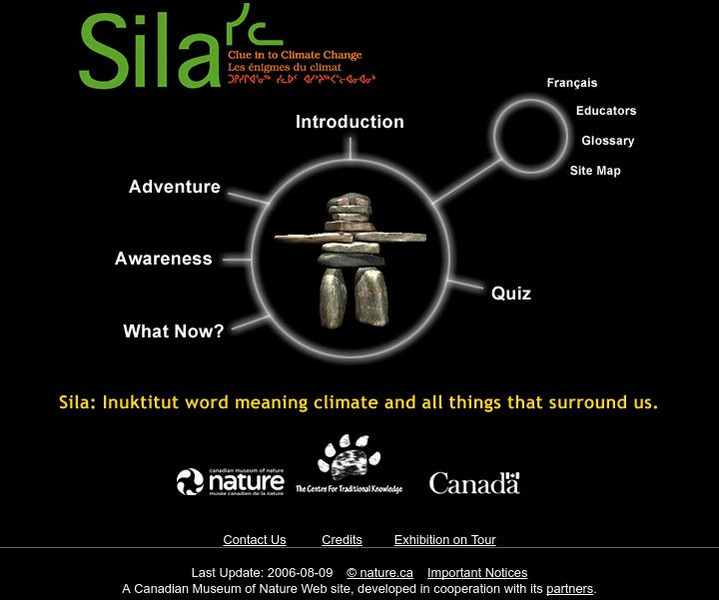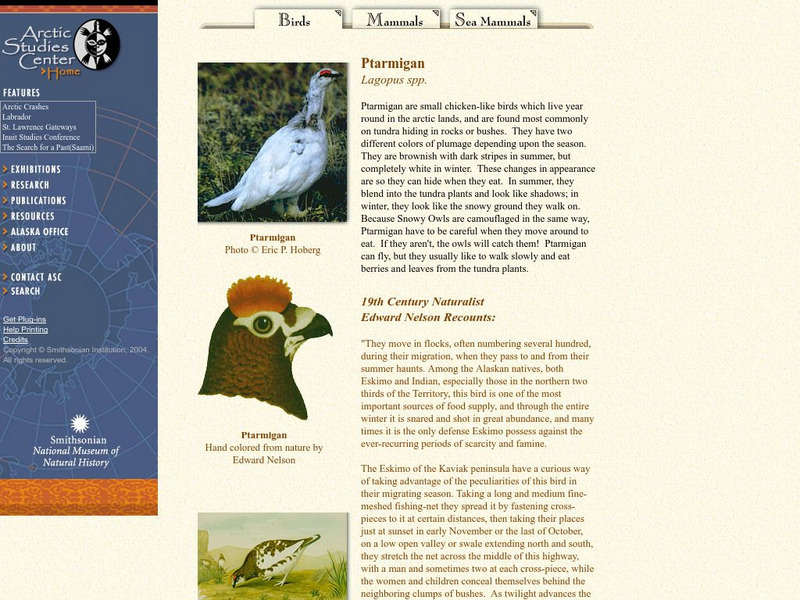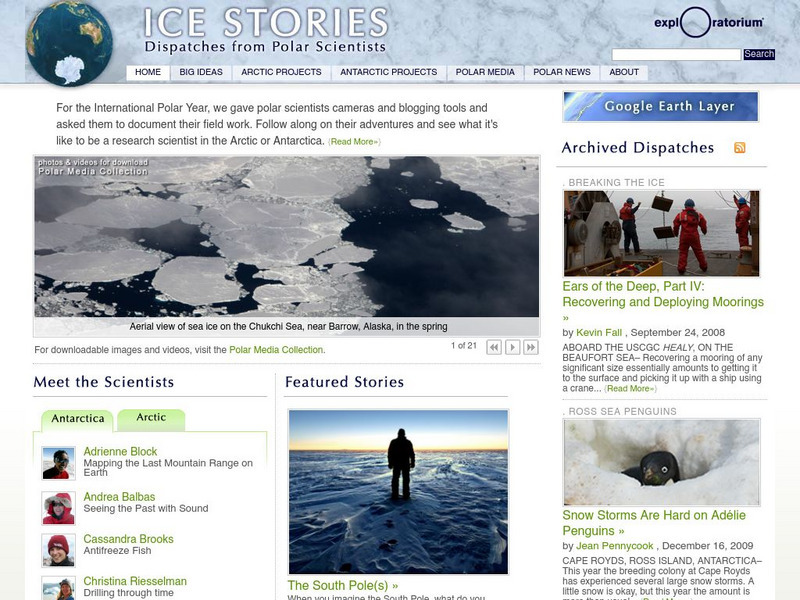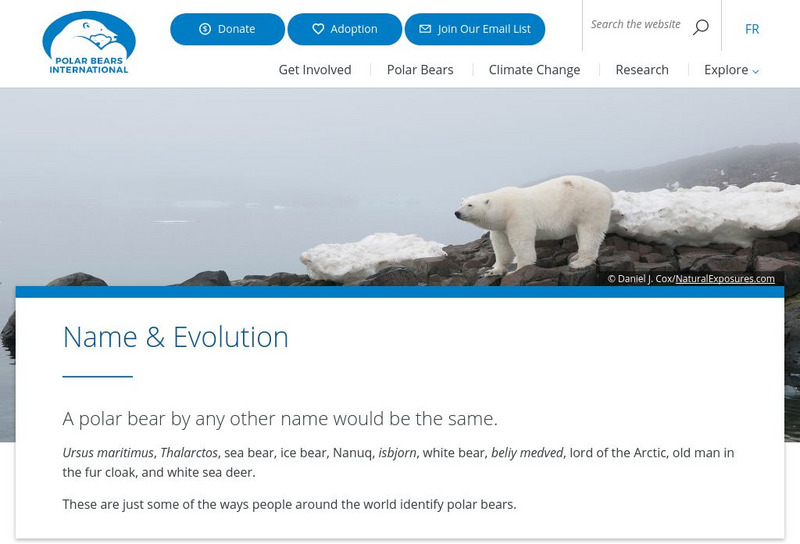E-learning for Kids
E Learning for Kids: Science: Arctic Ocean: How Can We Change Materials?
Join Jacob on the Nova Zembla Expedition, and help him use suitable materials for building his house.
Canadian Museum of Nature
Canadian Museum of Nature: Sila: Clue Into Climate Change
The Arctic is where climate is changing at a faster pace than any other place in the world. Explore Water, Earth, Fire, and Air to investigate the basic elements that support all life and learn about the impact climate change is having...
Curated OER
Bureau of Land Management: Alaska's Cold Desert
Learn about the Arctic tundra biome of Alaska. A discussion of its characteristics, and the animals and the plants that live there.
Smithsonian Institution
National Museum of Natural History: Ptarmigan
This Smithsonian website has a brief, but thorough, article on the Ptarmigan. It also includes pictures and an extensive quote from 19th Century naturalist Edward Nelson.
Exploratorium
Exploratorium: Ice Stories: Dispatches From Polar Scientists
During the International Polar Year, scientists descended on the Arctic and the Antarctic in droves. While there, they documented their experiences and research work. That rich database of information, covering November 2007 to October...
Canadian Wildlife Federation
Hinterland Who's Who: Muskox
Get the facts about the muskox. Besides finding a detailed description of this resident of Canada?s arctic tundra, you?ll also learn about some of its unique facts and characteristics. Also included in this Mammal Fact Sheet on the...
Other
International Polar Year
International Polar Year is a multinational endeavour to study the Arctic and Antarctic over a period of two years. More than 200 scientific proects will be undertaken between March 2007 and March 2009.
Carnegie Museum of Natural History
Carnegie Museum of Natural History: Needle to the North
Online exhibit explores Arctic expeditions of the twentieth-century via the photos and field notes of researchers who experienced the "alien landscape rife with cold, darkness, and isolation."
NOAA
Noaa: Where Will the Polar Bears Go? [Pdf]
Get to know polar bears and learn why it is important for them to live in the current arctic conditions. Make a poster that demonstrates your understanding of how climate change in the arctic could affect polar bears and humans.
Ohio State University
Beyond Penguins and Polar Bears
This online magazine for educators is geared to integrate inquiry-based science and literacy focused in the concentrated area of the arctic and antarctic.
Ohio State University
Beyond Penguins and Polar Bears
This online magazine for educators is geared to integrate inquiry-based science and literacy focused in the concentrated area of the arctic and antarctic.
Smithsonian Institution
National Museum of Natural History: Looking Both Ways
This is an interactive exhibit from the Smithsonian Arctic Studies Center featuring the Alaskan Native Alutiiqs. Learn much information about the people, their culture, and see where they live.
National Snow and Ice Data Center
National Snow and Ice Data Center: All About Sea Ice
An intensive look at sea ice, its characteristics, how it is formed, where it occurs, why it is so important, scientific research, its impact on early explorers' voyages, and so on. Antarctic and Arctic sea ice are compared for...
Curated OER
National Park Service: Bering Land Bridge National Preserve
Hands-on curriculum unit in which students will explore the Bering Land Bridge National Preserve and learn about the past and present cultures of this arctic landscape. Students will also discover the plants, animals, and geology of this...
NASA
Nasa: Astrobiologists to Hunt Small Game in Siberia
A detailed article on information obtained from the Arctic permafrost. Scientists find vegetation in ice. Very Interesting! (July 27, 1999)
NWT Literacy Council
Nwt Literacy Council: Five Photo Stories (For Beginning Adult Readers) [Pdf]
The activities in this extensive unit (163 pages) are intended for adult learners but could be adapted for struggling readers at younger ages. The photo stories are brief, only a few sentences, and focus on Arctic topics, such as sled...
Other
The Road to Nunavut
This web page sources the creation of Nunavut to the land claims made by aboriginals as it traces the evolution of people and communities in the Northwest Territories. The ultimate establishment of Nunavut is accounted for by the...
Other
Polar Bears International: The Bear Facts
This site from Polar Bears International, dedicated to the worldwide conservation of the polar bear and its arctic habitat, provides extensive information about the polar bear. Content includes polar bear I.Q., hibernation facts,...
Curated OER
Cbc: Human Odyssey: A World of Extremes
Immerse yourself in the nomadic worlds of people who live in extreme environments. The Badjao are sea nomads in the Philippines who still live a hunter-gatherer existence but they do it on water. The Bushmen are desert nomads living in...
Smithsonian Institution
National Museum of Natural History: Arctic Studies Center: Aleut
The Arctic Studies Center at the Smithsonian provides general notes on the Aleut people of Alaska. Includes a picture of a painting of an Aleut Hunter.
Smithsonian Institution
National Museum of Natural History: Muskox
This site takes a very brief look at the muskox as an arctic creature. Several photographs are also provided.
PBS
Pbs Learning Media: The Sled Dogs of the Arctic Circle
In this video segment from Nature, learn about the role of dogs in the Inuit culture.
The BIG zoo
The Big Zoo: Polar Bear
Virtual Zoo site provides some insight into these arctic creatures. Contains a physical description as well as information regarding their diet, habitat, social structure and birth and offspring.
Other popular searches
- Arctic Animals
- Arctic Food Chain
- Arctic Ocean
- Arctic Ocean Diorama
- Preschool Arctic Animals
- Arctic Plants and Animals
- Arctic Region
- Arctic Circle
- Arctic Hare
- Arctic Peoples
- Arctic Predators
- Global Climate Change Arctic














